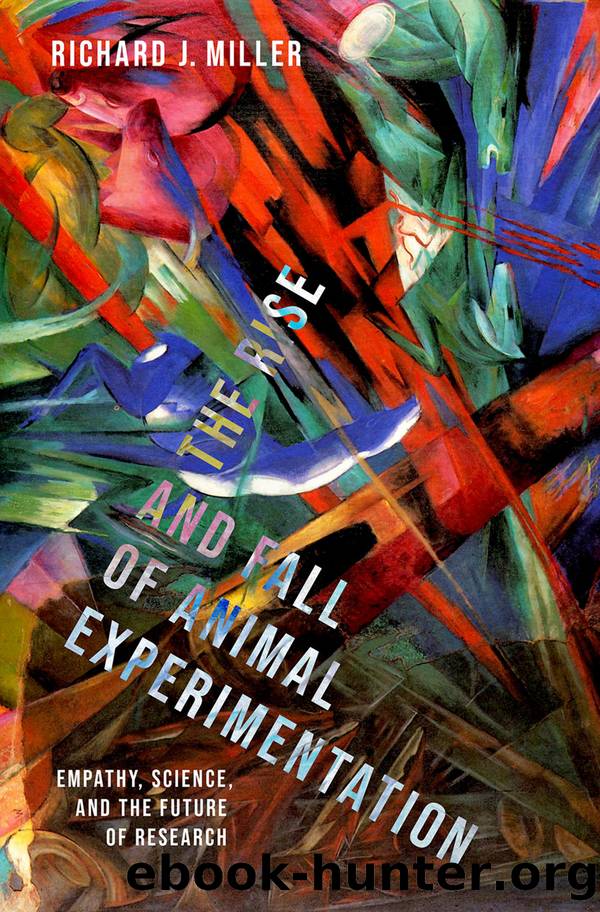The Rise and Fall of Animal Experimentation by Richard J. Miller

Author:Richard J. Miller
Language: eng
Format: epub
Publisher: Oxford University Press
Published: 2023-08-15T00:00:00+00:00
Nowadays, a unique vital spirit seems like a simplistic idea; life is not just about one thing like adding yeast to bread and getting it to rise. We would certainly say from our modern perspective that life isnât a single process but a set of interlocking systems of great complexity. But understanding exactly how this works in practice has eluded us.
Of course, our general ignorance as to what precisely contributes to and sustains life has not stopped us speculating about it, attempting to produce it, and, from the very beginning of our efforts, worrying about the potential consequences of doing so. Writing at a time when the winds of change were carrying the concepts of Romantic biology throughout the world, Mary Shelley warned us about the possible insanity that might result from our attempts, and her message has been often repeated in stories like H. P. Lovecraftâs âHerbert WestâReanimatorâ down to the present day. For Herbert West, the secret wasnât electricity, but a powerful fluid extracted from freshly disinterred corpses that could be injected into the dead. They came back to life but were horribly changed.
Even the most up-to-date thinking in the sciences and the humanities struggles to define what death actually entails and how irreversible a state it really is. In most countries, a person can be legally declared dead if they show irreversible loss of all brain functions (brain death) or irreversible loss of all circulatory cardiovascular functions (circulatory death). This implies, of course, that such things cannot be reliably restored. Most people would probably agree that this seems reasonable; if the brain and heart show no activity, then what remains?
Surprisingly, the contemporary scientific answer to this question would be âquite a lot.â The brain, for example, the most fragile of all our organs, requires a great deal of energy to work properly, and even a few minutes without oxygen, something that might occur during a stroke, usually leaves the brain âirreversiblyâ damaged, producing lifelong problems with movement and cognition. Indeed, a serious stroke is frequently fatal. In such cases the brain ceases to function and that is that; there is no going back. That is what most of us believe. Frankenstein is a nice story, but itâs just a story. In 2019, this conclusion was tested by a group of researchers at Yale University and published in the journal Nature.1 They took the brains from 300 pigs that had been slaughtered and waited four hours. They then hooked the brains up to a perfusion system containing a nutrient-rich solution called BrainEx. The result of this procedure was remarkable. The investigators observed that many brain functions were restored. Blood vessels in the brain could be made to dilate and contract like a normal brain and so on. When nerve cells in slices of the treated brains were examined in a laboratory, they were able to fire action potentials, the electrical signals that are fundamental to a functioning brain. On the other hand, brains that hadnât been perfused with Brainex showed no activity of any kind.
Download
This site does not store any files on its server. We only index and link to content provided by other sites. Please contact the content providers to delete copyright contents if any and email us, we'll remove relevant links or contents immediately.
| Anatomy | Animals |
| Bacteriology | Biochemistry |
| Bioelectricity | Bioinformatics |
| Biology | Biophysics |
| Biotechnology | Botany |
| Ecology | Genetics |
| Paleontology | Plants |
| Taxonomic Classification | Zoology |
Sapiens: A Brief History of Humankind by Yuval Noah Harari(14367)
The Tidewater Tales by John Barth(12651)
Mastermind: How to Think Like Sherlock Holmes by Maria Konnikova(7321)
Do No Harm Stories of Life, Death and Brain Surgery by Henry Marsh(6934)
The Thirst by Nesbo Jo(6932)
Why We Sleep: Unlocking the Power of Sleep and Dreams by Matthew Walker(6703)
Life 3.0: Being Human in the Age of Artificial Intelligence by Tegmark Max(5547)
Sapiens by Yuval Noah Harari(5365)
The Body: A Guide for Occupants by Bill Bryson(5080)
The Longevity Diet by Valter Longo(5058)
The Rules Do Not Apply by Ariel Levy(4957)
The Immortal Life of Henrietta Lacks by Rebecca Skloot(4575)
Animal Frequency by Melissa Alvarez(4459)
Why We Sleep by Matthew Walker(4434)
The Hacking of the American Mind by Robert H. Lustig(4375)
Yoga Anatomy by Kaminoff Leslie(4358)
All Creatures Great and Small by James Herriot(4311)
Double Down (Diary of a Wimpy Kid Book 11) by Jeff Kinney(4261)
Embedded Programming with Modern C++ Cookbook by Igor Viarheichyk(4173)
